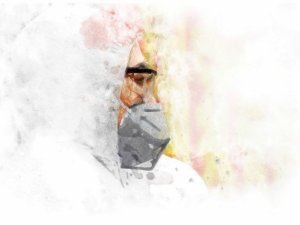
今天是2020年3月10日 星期二 第二十五篇
今天,陽光下的武漢流露出一些孤傲的氣質,人們坐在家中,並不特別留意窗外的景色。
最近幾日,命名無疫情小區的事引人注目,只以為是為分批解除小區封閉做前期准備,並不覺得有什麼特別意味。
與平時相比,被封閉的人更加關注自己的內心,對外面的風吹草動大多持聽之任之的態度,反正也出不去。
今天新增確診人數又在下降,似有突破2位數的趨勢。現在正是農曆2月春暖咋寒的時候,也是感冒和流感多發時期,常人稍有不慎就會受涼,而那些感覺自己頭疼腦熱的人對是否選擇就醫也必多有躊躇,畢竟交叉感染及隨時被隔離的風險還是讓很多人畏懼。
最近,媒體及網絡對他國疫情及那些國家所采取的防控政策多有披露,雖然有爭議,但至少對我來說,確實起到了消除恐慌的作用。難道這也是一種心理疏導和安慰。
很多人都說過,戰勝自我是人生的重要課題,也是邁向成功的開始。我覺得很有道理。在目前尚沒有對症藥物和疫苗的情況下,消除對冠狀病毒的恐懼從而獲得戰勝疾病的自信,對我們普通人尤為重要。但如何獲得自信?
在我看來,及時公開信息,廣泛宣傳普及防疫知識,提供充分而強有力的的醫療資源,建立政府與公民之間的相互信任是消除恐懼並建立信心的基本條件。
自一月二十三日封城至二月中旬,我們的城市被陰雲籠罩,一片哀鴻。病人家屬將危重患者放倒於社區門口,社區人員在隨時都可能被感染的危境中,顫抖著,不知所措。所有的反饋和表達都凝縮成世間最冷酷也是最麻木的四個字,沒有床位,沒有床位。不斷傳來的死亡消息無情地鞭打著整座城市。
這樣的人間慘劇為什麼會發生,就在這之前,我們還在喜氣洋洋的准備過新年的氛圍之中,永遠充滿正能量的電視臺還在播放著萬人盛宴舉國歡唱的美好畫面,行政長官還在義正辭嚴地駁斥一切謠言,公安機關還在對傳謠者進行訓誡處置。然而悲劇還是發生了,突如其來,猝不及防。之前我們的專家、學者和政府高官不是還信誓旦旦地說經曆過非典,我們有足夠的信心和能力防範應對所有類似的疫情嗎?
沒有床位四個字,已經說明這個城市的醫療資源和能力薄弱到何等程度,開展救治的醫生們竟然缺少口罩等幾乎所有的一切防護設施而只能裸奔。在如此狀態中的市民如何能夠不恐慌、不恐懼,到哪裏去獲得自信?而幾無懸念,恐慌中的政府連續失誤也在所避免。讓病人坐守家中名曰居家隔離,造成更多的交叉感染;讓社區充當防火牆掩體工事,使市民對政府失去信任。疫情之迅速擴散如潰堤之水,無從抵擋。黑暗瞬間籠罩了整座城市、每個家庭。
反過來說,當初如果及時公開疫情信息,充分利用媒體網絡廣泛宣傳普及科學的防疫知識,示範科學的防疫方法如勤洗手、避免人群聚集等等,疫情何至於如此迅速蔓延,又何至於使所有發熱的人們在突如其來的恐慌中一起湧入原本不堪重負的醫療機構,不遺餘力的爭搶原本少得可憐的床位。如果在此之前,政府實實在在地致力於城市醫療建設,加強醫療投入,培養防疫人才,那麼在疫情發生後對病人做到應收盡收,恐慌又何至於越演越烈,以致病人因不得救治而暴露並流動於社會,從而導致更為嚴重的交叉感染。
信息不能公開,輿論遭受打壓。為掩蓋真相欺瞞民眾,科學防疫知識的宣傳普及就無從談起。醫療資源薄弱,醫療機構倉促應對,病患者得不到及時醫治,恐慌就無從避免,民眾與政府間的信任也就無法實現,所謂的共同抗疫只能流於口號。這就是這場疫情前期防疫失敗並給市民造成巨大損失傷害的根本原因,而造成這一原因的原因更需要我們深刻反省。否則,所謂的犧牲也只能是白白的犧牲,下一次我們仍將重蹈覆轍。
沒有對根本原因乃至制度深刻反省的追責其實毫無意義,充其量只是為政府官員們升遷罷黜提供一次契機而已。
TUESDAY, MAR. 10, 2020
Today, the sunny Wuhan has a somewhat solitary quality, with
people sitting at home and not paying particular attention to the scenery
outside their windows.
In recent days, the naming of the outbreak-free community has
become a big deal. Still, I thought it was a pre-preparation for lifting the
closure of the areas in batches, and I didn't think it meant anything special.
Compared to regular times, locked down people are more
concerned about their own minds, and most of them take a casual attitude
towards the outside world, as they can't get out anyway.
Today, the number of new cases is dropping again and seems to be
breaking the double-digit trend. It's Springtime and cold in February on
the Chinese calendar, a time when colds and flu are common, and people
who are not careful can catch a cold.
Recently, the media and the internet have been revealing a lot about
the pandemic in other countries and the prevention and control policies
adopted by those countries, which although controversial, did at least for
me, have the effect of dispelling the panic. It was a kind of psychological
relief and comfort too.
Many people have said that overcoming oneself is an essential act in
life and the beginning of success. I think it makes sense. In the absence
of cure drugs and vaccines, it is especially important for us, the ordinary
people, to overcome the fear of the Covid-19 virus and gain the
confidence to overcome the disease. But how do we gain that confidence?
In my opinion, timely disclosure of information, widespread
publicity and knowledge of pandemic prevention, adequate and strong
medical resources, and building mutual trust between government and
citizens are essential to dispel fears and build confidence.
From January 23rd to mid-February, our city was shrouded in a
cloud of gloom and woe. Families of patients dumped their critically ill
patients at the community center gates, and the staff trembled,
overwhelmed by the possibility of being infected at any moment. All the
feedback and expressions were condensed into the coldest and most
numbing words in the world: no beds, no beds. The constant news of
death whipped the city relentlessly.
How could such a tragedy happen? Just before this, we were still in
a joyful atmosphere preparing for the New Year. The ever-positive TV
stations were still broadcasting the beautiful picture of the 10,000 people
feasting and singing. The Chief Executive was still righteously refuting all
the rumors and the public security authorities were still admonishing and
dealing with the rumor mongers. However, the tragedy still happened,
suddenly and unexpectedly. Didn't our experts, academics and senior
government officials swear that we had experienced SARS and that we
were confident and capable of preventing and dealing with all similar
outbreaks?
The two words "no beds'' already show how weak the city's medical
resources and capabilities are. The doctors who carried out the treatment
lacked almost all the protective gear such as masks and had to run around
naked. How can people in such a state, not panic, not fear, where to gain
confidence? And it is almost inevitable that the government will make
successive mistakes in the panic. Allowing patients to sit in their homes
in the name of home isolation caused more cross-infection; allowing
communities to act as firewall bunkers caused the public to lose trust in
the government. The rapid spread of the pandemic was like a collapse of
the dike, and there was no way to stop it. Darkness instantly enveloped
the entire city and every family.
If the information about the pandemic had been made public in time,
the media network had been fully utilized to disseminate scientific
knowledge of pandemic prevention such as frequent hand washing and
avoiding crowd gathering, the virus would not have spread so rapidly. All
the people with fevers would not have swarmed the overburdened
medical institutions in the sudden panic. They would have spared no
effort to fight for the pitifully small number of beds. If the government
had made a real effort to build the city's health care system, strengthen
medical investment and train pandemic prevention personnel beforehand,
would the panic have intensified after the outbreak? As a result, in
patients being exposed and circulating in the community because they
could not be treated, thus leading to more severe cross-infection?
Information cannot be disclosed. Public opinion cannot be
suppressed. Covering up the truth and deceiving the public has no way
to spread scientific knowledge about pandemic prevention. Because
medical resources were limited, medical institutions were rushed to
respond. Patients were not treated timely; panic could not be avoided,
Trust between the public and the government could not be established,
and the so-called joint fight against the pandemic was just a slogan. That
is the fundamental reason why the government has failed to prevent the
pandemic and caused huge losses and injuries to the public, and the
reason for this requires deep introspection. Otherwise, the so-called
sacrifice will only be in vain, and we will repeat the same mistake next
time.
It is meaningless to pursue the blame without a deep reflection on
the root causes and even the system. Still, at best, it will only provide an
opportunity to promote and dismiss the government officials.



